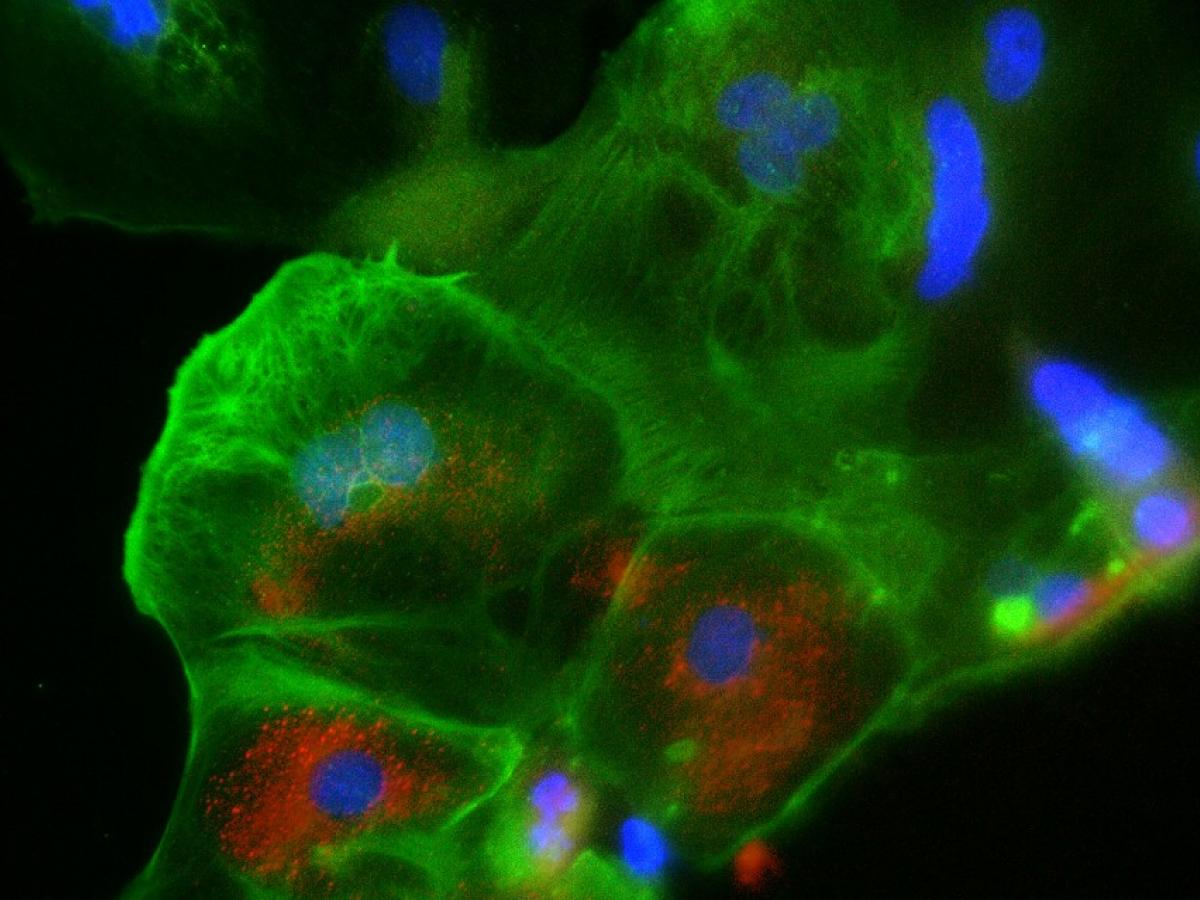
Placenta cells (syncytiotrophoblast, in green) infected with the SARS-CoV-2 virus (COVID-19, in red). Cell nuclei (in blue) of the multinucleated syncytiotrophoblasts. Courtesy Joseph Chen.
In a landmark study published in , Australian researchers, led by Professor Jose Polo from Monash University and the University of Adelaide and University of Melbourne’s Professor Kanta Subbarao from the Peter Doherty Institute for Infection and Immunity (Doherty Institute), have revealed how COVID-19 can infect the human placenta.
Research has shown that COVID-19 infections during pregnancy may lead to adverse outcomes, but little is known about the mechanisms behind the effects of SARS-CoV-2 infection in pregnancy.
The Australian research team grew placenta tissue in the lab, using a state-of-the-art method developed by Professor Polo and colleagues where human skin cells are “reprogrammed” into trophoblast stem cells (the cells that help a developing embryo attach to the wall of the uterus, forming part of the placenta). They found that ACE2, a protein that acts as the doorway for SARS-CoV-2 to enter organs such as the lung, is present in specific placental cells, like syncytiotrophoblasts (ST cells).
Importantly, ST cells were susceptible to the virus – a major finding as these placental cells produce the key hormone for maintaining pregnancy (hCG).
Dr Joseph Chen, a stem cell biologist at Monash University and co-first author of the study, said this discovery explains several of the previous clinical reports.
“We observed that SARS-CoV-2 infection led to a significant reduction in the survival and differentiation of ST cells, which in turn resulted in lower production of hCG,” he said.
“It suggests that this is how COVID-19 could impact pregnancy, though further investigations are needed.”
Virologist at Doherty Institute and co-first author of the study Dr Jessica Neil said, “our team also discovered that anti-ACE2 antibodies and antiviral drugs were effective in preventing SARS-CoV-2 infection and restoring normal ST differentiation and function”.
Professor Subbarao said that this study is a significant advance for the broader understanding of viral infections in pregnancy.
“Our study provides valuable insights into the link between SARS-CoV-2 infection and placenta pathology. This is a game changer as we are now equipped to explore how the early placenta may be affected by other viruses as well,” she said.
Professor Polo emphasised the importance of the research in establishing a platform to study early placental cell types.
“This study not only helps us to understand what happens when the placenta is infected with the COVID-19 virus during pregnancy, it also means we have established a broader, scalable and tractable platform to study early placental cell types,” he said.
——
Additional information:
- The study was published in peer-reviewed journal Nature Cell Biology (DOI: 10.1038/s41556-023-01182-0).
- This research was funded by the Medical Research Future Fund (MRFF), Australian Research Council, the ³Ô¹ÏÍøÕ¾ Health and Medical Research Council, the Victorian Government and the Australian Government.
——
About the Monash Biomedicine Discovery Institute
Committed to making the discoveries that will relieve the future burden of disease, the (BDI) at Monash University brings together more than 120 internationally-renowned research teams. Spanning seven discovery programs across Cancer, Cardiovascular Disease, Development and Stem Cells, Infection, Immunity, Metabolism, Diabetes and Obesity, and Neuroscience, Monash BDI is one of the largest biomedical research institutes in Australia. Our researchers are supported by world-class technology and infrastructure, and partner with industry, clinicians and researchers internationally to enhance lives through discovery.
About the Peter Doherty Institute for Infection and Immunity
Finding solutions to prevent, treat and cure infectious diseases and understanding the complexities of the immune system requires innovative approaches and concentrated effort. This is why The University of Melbourne – a world leader in education, teaching and research excellence – and The Royal Melbourne Hospital – an internationally renowned institution providing outstanding care, treatment and medical research – have partnered to create the Peter Doherty Institute for Infection and Immunity (Doherty Institute); a centre of excellence where leading scientists and clinicians collaborate to improve human health globally.
About the University of Adelaide
The University of Adelaide unites and serves those striving to change the world-and themselves-for the better. It’s a place where history is made.
From the inception of Adelaide Medical School in 1885 to the present day, the University has been committed to improving health and care around the world. Through inspired teaching, groundbreaking research, and cutting-edge facilities, graduates are equipped to not only deliver the best care, but to become tomorrow’s health leaders.
The University also delivers outstanding health research for the benefit of society. With a strong emphasis on productive industry partnerships, respected health researchers lead transformative investigations that generate a rich stream of new insights, innovative technologies and treatments, and improved policy.







